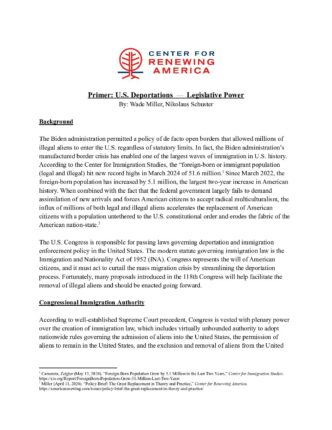
Primer: U.S. Deportations — Legislative Power
Background
The Biden administration permitted a policy of de facto open borders that allowed millions of illegal aliens to enter the U.S. regardless of statutory limits. In fact, the Biden administration’s manufactured border crisis has enabled one of the largest waves of immigration in U.S. history. According to the Center for Immigration Studies, the “foreign-born or immigrant population (legal and illegal) hit new record highs in March 2024 of 51.6 million.1 Since March 2022, the foreign-born population has increased by 5.1 million, the largest two-year increase in American history. When combined with the fact that the federal government largely fails to demand assimilation of new arrivals and forces American citizens to accept radical multiculturalism, the influx of millions of both legal and illegal aliens accelerates the replacement of American citizens with a population untethered to the U.S. constitutional order and erodes the fabric of the American nation-state.2
The U.S. Congress is responsible for passing laws governing deportation and immigration enforcement policy in the United States. The modern statute governing immigration law is the Immigration and Nationality Act of 1952 (INA). Congress represents the will of American citizens, and it must act to curtail the mass migration crisis by streamlining the deportation process. Fortunately, many proposals introduced in the 118th Congress will help facilitate the removal of illegal aliens and should be enacted going forward.
Congressional Immigration Authority
According to well-established Supreme Court precedent, Congress is vested with plenary power over the creation of immigration law, which includes virtually unbounded authority to adopt nationwide rules governing the admission of aliens into the United States, the permission of aliens to remain in the United States, and the exclusion and removal of aliens from the United States.3 The Executive Branch, broadly, and the states, under specific constitutional authorities, retain the power to enforce those laws and/or secure the border, whether through general enforcement or to stop an invasion. Although the Constitution does not explicitly mention immigration, the Supreme Court has described immigration powers as emanating from the “sovereignty belonging to the government of the United States as a part of those sovereign powers delegated by the Constitution.”4 The United States government possesses all those powers inherently possessed by, and essential to, the self-preservation of, any sovereign state––which encompasses the absolute prerogative to control its territorial borders and determine whether and to what extent any aliens may come within its sovereign territory.5 Substantial judicial deference is afforded to the federal government’s legislation and execution of immigration laws and policies, especially where delicate national security matters are implicated.
118th Congress Immigration Enforcement Proposals
Congress has broad power to establish rules for detaining and removing aliens. Congress can utilize its legislative authority to amend the INA’s statutory framework so that illegal aliens who undermine immigration rules by entering the United States in violation of the law are subject to enhanced criminal liability.6 The Secure the Border Act of 20237 (H.R. 2), passed by the House of Representatives in May 2023 (but not by the Democrat-controlled Senate), codifies immigration policies implemented by President Donald Trump. These policies include enhanced removal and detention changes. For example:
- The bill would stipulate that illegal aliens who are in the U.S. without a valid admission would be subject to expedited removal.8
- The Department of Homeland Security (DHS) could require an illegal alien to return to a country they arrived from that shares a border with the U.S. for the duration of their immigration proceedings.9
- Removal would be mandatory if the department could not detain the individual or send them to a safe third country.10
- Removal would be mandatory if the department could not detain the individual or send them to a safe third country.10
- State attorneys general could seek judicial relief against DHS if the department violates detention, return, or removal requirements.11
- DHS could prohibit the entry of certain illegal aliens who arrive between ports of entry or lack valid documentation to achieve “operational control” of the border.12
- DHS would be directed to take “all necessary actions” to reopen or restore immigrant detention facilities in operation on Jan. 20, 2021, at the end of the first Trump administration.13
- DHS would be required to detain families together who crossed the border illegally while their charges are pending.14
- Visa overstays would be treated as unlawful border entries and subject to similar civil and criminal penalties. First-time violations could result in imprisonment for as long as six months and repeat violations for as long as two years.15
- The bill would also increase the civil penalties for unlawful border entry to $500 to $1,000 instead of $50 to $250.16
Additionally, the House of Representatives has considered several stand-alone bills addressing detention and removal throughout the 118th Congress. For example, H.R. 7343, as passed by the House, would require DHS to detain any illegal alien who is charged with, arrested for, convicted of, or admits to committing assault on a law enforcement officer, firefighter, or other first responder.17 Another bill, H.R. 7909, makes any sex offense (including crimes against minors) or conspiracy to commit a sex offense a basis for deportation.18 Since the beginning of the 119th Congress, the Republican majorities in the House and Senate have begun considering many immigration bills that passed the House during the 118th Congress. For example, President Trump recently signed the Laken Riley Act into law, which requires DHS to detain certain illegal aliens who have been arrested for burglary, theft, larceny, or shoplifting. It also authorizes states to sue the federal government for decisions or alleged failures related to immigration enforcement.19
These policies provide substantial remedies for curbing and reversing the illegal alien invasion degrading the social and economic fabric of the United States.
E-Verify — Worksite Enforcement
The Secure the Border Act of 2023 would require employers to use E-Verify, a web-based system that allows public and private sector employers to confirm that employees are eligible to work in the United States.20 The system would have to provide a confirmation or tentative non-confirmation of an individual’s identity and employment eligibility within three business days of an employer’s initial inquiry.21 The bill would require mandatory verification of new hires by employers that have:
- 10,000 or more employees beginning six months after enactment.22
- 500 or more employees beginning 12 months after enactment 23
- 20 or more employees beginning 18 months after enactment.24
- At least one employee beginning 24 months after enactment.25
Mandatory E-Verify is a vital tool that will expose illegal alien workers and ensure that they do not continue to take jobs away from American citizens. In making employment more difficult for illegal aliens to secure, E-Verify will help facilitate the deportation process by putting downward pressure on those already here illegally to self-deport, and by providing information to government officials that could lead to the enhanced detention and removal process described above. In the absence of a national E-Verify requirement, states should also consider adopting mandatory E-Verify in order to deter illegal aliens from going to those states.
Reforming Immigration Courts
According to the House Judiciary Committee, during the Biden administration, immigration judges dismissed, terminated, or administratively closed more than 700,000 immigration cases26, including:
- 71,465 cases that were administratively closed (through July 31, 2023)27;
- 459,356 cases that were dismissed (through June 30, 2024)28; and
- 172,645 cases that were terminated (through June 30, 2024).29
The pace of case dismissals, terminations, and closures increased every year that the Biden administration was in office.30 Without adjudicating cases and ordering illegal aliens to be removed from the United States, immigration judges’ mass granting of dismissals, terminations, and closures ensures that aliens can remain in the U.S. for as long as they want.31 Congress should take action and implement reforms to the immigration court system to ensure all cases are adjudicated swiftly with a strong statutory bent toward a sovereignty-first philosophy that tethers the rule of law to the well-being of American citizens.
U.S. Census Bureau
The U.S. Census Bureau, the entity tasked with gathering the data to determine congressional districts, counts non-citizens as part of the apportionment process.32 This deprives American citizens of political power by shifting seats in Congress to the left and ensures more Electoral College votes go to the Democratic Party.33 The Census should not be manipulated for partisan gain. Congress should prohibit the Bureau from counting illegals when it comes to congressional apportionment but still maintain a total headcount, thereby providing the Trump administration a decent estimate of the total illegal alien population that is hiding in plain sight. Forcing the Census to bifurcate could help with the logistics of future mass deportation efforts that the Trump administration will undertake.
Conclusion
Congress has substantial authority to change and revive laws associated with deportations and immigration enforcement. Members of the U.S. Senate and House of Representatives take a sworn oath to “defend the Constitution of the United States against all enemies, foreign and domestic.” They are responsible for representing the American citizens that elected them. Millions of illegal aliens pouring across the border, which displaces American citizens politically and economically, represent a grave threat to the long-term survival of the republic. It is past time for Members to fulfill their oaths and secure the nation for future generations of American citizens by codifying successful Trump enforcement policies and streamlining presidential authority to conduct mass deportations of illegal aliens.
Endnotes
1. Camarota, Zeigler (May 13, 2024). “Foreign-Born Population Grew by 5.1 Million in the Last Two Years,” Center for Immigration Studies. https://cis.org/Report/ForeignBorn-Population-Grew-51-Million-Last-Two-Years
2. Miller (April 11, 2024). “Policy Brief: The Great Replacement in Theory and Practice,” Center for Renewing America. https://americarenewing.com/issues/policy-brief-the-great-replacement-in-theory-and-practice/
3. See Kleindienst v. Mandel, 408 U.S. 753, 766 (1972) (“The Court without exception has sustained Congress’ ‘plenary power to make rules for the admission of aliens and to exclude those who possess those characteristics which Congress has forbidden.’” (quoting Boutilier v. INS, 387 U.S. 118, 123 (1967))); Oceanic Steam Navigation Co. v. Stranahan, 214 U.S. 320, 343 (1909) (discussing “the complete and absolute power of Congress over the subject [of immigration]”); Galvan v. Press, 347 U.S. 522, 531 (1954) (holding that the ex post facto Clause “has no application to deportation” because “policies pertaining to the entry of aliens and their right to remain here are peculiarly concerned with the political conduct of government” and “the formulation of these policies is entrusted exclusively to Congress”).
4. Ping v. United States, 130 U.S. 581, 609 (1889) (upholding a law that prohibited the return to the United States by Chinese laborers who had been issued, prior to their departure therefrom and under a predecessor law, certificates entitling them to return).
5. Trump v. Hawaii, 585 U.S. 667, 702 (2018) (“For more than a century, this Court has recognized that the admission and exclusion of foreign nationals is a ‘fundamental sovereign attribute exercised by the Government’s political departments largely immune from judicial control.’” (quoting Fiallo v. Bell, 430 U.S. 787, 792 (1977))); Landon v. Plasencia, 459 U.S. 21, 32 (1982) (“This Court has long held that an alien seeking initial admission to the United States requests a privilege and has no constitutional rights regarding his application, for the power to admit or exclude aliens is a sovereign prerogative.”); Mandel, 408 U.S. at 765 (“In accord with ancient principles of the international law of nation-states, the Court . . . held broadly, . . . that the power to exclude aliens is ‘inherent in sovereignty, necessary for maintaining normal international relations and defending the country against foreign encroachments and dangers.’” (internal citations omitted)); Harisiades v. Shaughnessy, 342 U.S. 580, 588–89 (1952) (explaining that “the traditional power of the Nation over the alien is a power inherent in every sovereign state”); Nishimura Ekiu v. United States, 142 U.S. 651, 659 (1892) (“It is an accepted maxim of international law that every sovereign nation has the power, as inherent in sovereignty, and essential to self-preservation, to forbid the entrance of foreigners within its dominions, or to admit them only in such cases and upon such conditions as it may see fit to prescribe.” (citing Emer de Vattel, The Law of Nations, bk. II, §§ 94, 100 (1758)); United States ex rel. Turner v. Williams, 194 U.S. 279, 290 (1904) (expounding the “accepted principle of international law, that every sovereign nation has the power, as inherent in sovereignty and essential to self-preservation, to forbid the entrance of foreigners within its dominions”).
6. Santamaria (August 30, 2023). “Immigration Crimes: Improper Entry and Reentry,” Congressional Research Service. https://crsreports.congress.gov/product/pdf/R/R47667
7. Rep. Diaz-Balart (May 2023). “H.R.2 – Secure the Border Act of 2023,” Congress.gov. https://www.congress.gov/bill/118th-congress/house-bill/2?s=2&r=1
8. Lee, Lohr, Turenchalk (May 11, 2023). “BGOV Bill Summary: H.R. 2, GOP Border Security Package,” Bloomberg Government. https://www.bgov.com/next/news/RUC2IXT0G1LE
9. Ibid.
10. Ibid.
11. Ibid.
12. Ibid.
13. Ibid.
14. Ibid.
15. Ibid.
16. Ibid.
17. Bruno,Kandel,Kolker, Singer, Straut-Eppsteiner, Wilson (September 5, 2024). “Immigration Legislation and Issues in the 118th Congress,” Congressional Research Service. https://crsreports.congress.gov/product/pdf/R/R47901
18. Rep. Mace (April 2024). “H.R.7909 – Violence Against Women by Illegal Aliens Act,” Congress.gov. https://www.congress.gov/bill/118th-congress/house-bill/7909
19. Sen. Britt (January 29, 2025). “S.5 – Laken Riley Act,” Congress.gov. https://www.congress.gov/bill/119th-congress/senate-bill/5?s=4&r=1
20. CBO Cost Estimate (May 9, 2023). “H.R. 2, Secure the Border Act of 2023,” Congressional Budget Office. https://www.cbo.gov/publication/59151
21. Lee, Lohr, Turenchalk (May 11, 2023). “BGOV Bill Summary: H.R. 2, GOP Border Security Package,” Bloomberg Government. https://www.bgov.com/next/news/RUC2IXT0G1LE
22. Ibid.
23. Ibid.
24. Ibid
25. Ibid
26. Staff Report (October 24, 2024). “Quiet Amnesty – How the Biden-Harris Administration Uses the Nation’s Immigration Court’s to Advance an Open Borders Agenda,” House Committee on the Judiciary. https://judiciary.house.gov/sites/evo-subsites/judiciary.house.gov/files/evo-media-document/2024-10-24%20Quiet%20Amnesty%20-%20How%20the%20Biden-Harris%20Administration%20Uses%20the%20Nation%27s%20Immigration%20Courts%20to%20Advance%20an%20Open-Borders%20Agenda.pdf
27. Ibid.
28. Ibid.
29. Ibid.
30. Ibid.
31. Ibid.
32. U.S. Census Bureau (November 1, 2024). “Frequently Asked Questions (FAQs) About Foreign-Born,” U.S. Census Bureau. https://www.census.gov/topics/population/foreign-born/about/faq.html
33. Camarota and Zeigler (October 31, 2024). “Estimating the impact of legal and illegal immigration on apportionment and political influence in the U.S. House and Electoral College,” Center for Immigration Studies. https://cis.org/Report/Tilting-Balance






